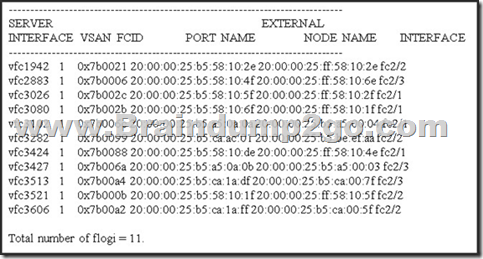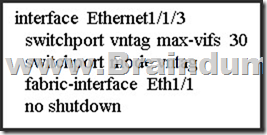2018 April New Cisco 300-180 Exam Dumps with PDF and VCE Free Updated Today! Following are some new CV0-001 Real Exam Questions:
1.|2018 Latest 300-180 Exam Dumps (PDF & VCE) 374Q&As Dowenload:
https://www.braindump2go.com/300-180.html
2.|2018 Latest 300-180 Exam Questions & Answers Download:
https://drive.google.com/drive/folders/0B75b5xYLjSSNRFptN0xiTENBMzA?usp=sharing
QUESTION 113
When configuring a traffic-monitoring session, which two guidelines are required to complete the task? (Choose two.)
A. For Ethernet traffic, the destination must be an unconfigured physical port.
B. For Fibre Channel, the destination must be a Fibre Channel uplink port.
C. For Ethernet traffic, the destination must be an active port that is assigned to an existing VLAN.
D. For Fibre Channel, the destination must be an inactive port on a VSAN.
Answer: AB
QUESTION 114
Which three send and receive locations an administrator can find the root cause for a network issue on the Cisco UCS domain? (Choose three.)
A. between fabric interconnect and LAN or SAN
B. between the FEX and fabric interconnect
C. between each FEX on the Cisco UCS chassis
D. between the host and FEX
E. between fabric interconnects within the domain
F. between the Cisco UCS chassis and system interconnects
Answer: ABD
QUESTION 115
Refer to the exhibit. When this configuration is entered on a fabric interconnect, which traffic is added as a source for a monitoring session?

A. the ingress traffic on uplink port 1 on slot 3
B. the ingress traffic on uplink port 3 on slot 1
C. the egress traffic on uplink port 1 on slot 3
D. the egress traffic on uplink port 3 on slot 1
Answer: D
QUESTION 116
Refer to the exhibit. Which command was executed on a Cisco UCS Fabric Interconnect in NX-OS mode to produce this output?

A. show flogi database
B. show npv flogi-table
C. show flogi
D. show npv flogi-database
E. show fcns database
Answer: B
QUESTION 117
Refer to the exhibit. A system administrator reviews the VIF paths and discovers an error.
What is the cause of the error?

A. The server has no connection to the SAN.
B. The server is still booting over SAN.
C. The server is still booting over iSCSI.
D. The server has the VIC with errors and needed to make an RMA.
E. The switch that is connected the fabric interconnect has a port that is unavailable.
Answer: C
QUESTION 118
Which two actions do you need to take to configure jumbo frames on UCS Manager? (Choose two.)
A. Choose QoS Policy Jumbo, choose the LAN tab, and set the MTU value to 9000.
B. Choose QoS System Class, choose the LAN tab, and set the MTU value to 9000.
C. Choose LAN Uplinks Manager, choose the LAN tab, and set the MTU value to the uplinks VLANs to 9000.
D. Choose the vNIC, and on the Server Profile set the MTU value to 9000.
E. On the Admin tab, under Global Policy, enable Jumbo MTU Bytes.
F. Go the fabric interconnect on the Equipment tab, right-click the port, and set the MTU value to 9000.
Answer: BD
QUESTION 119
What task is required before adding traffic sources to a monitoring session?
A. create a traffic monitoring session
B. choose a source component
C. activate the session
D. delete any earlier data collection
Answer: A
QUESTION 120
Which CLI command should you use to promote the local fabric interconnect to primary?
A. cluster primary force
B. cluster failover primary
C. cluster force primary
D. cluster failover
E. failover
Answer: C
QUESTION 121
Refer to the exhibit. What can you deduce from this configuration?

A. This configuration is not taken from a fabric interconnect.
B. This configuration refers to an uplink port on the fabric interconnect.
C. Fabric link Eth1/1/3 is pinned to uplink port Eth1/1.
D. A server in slot 3 is pinned to link 1 between IOM and the fabric interconnect.
Answer: D
QUESTION 122
Which Cisco UCS C Series command sequence initiates the sending of a technical support file to a TFTP server?
A. ucs /cimc # scope tech-support ucs /cimc/tech-support # set ip 10.1.1.1
ucs /cimc/tech-support *# set tftp-path \showtechsupport
ucs /cimc/tech-support *#commit ucs /cimc/tech-support *#start
B. ucs /cimc # scope tech-support
ucs /cimc/tech-support # set tftp-ip 10.1.1.1
ucs /cimc/tech- support *# set path \showtechsupport
ucs /cimc/tech-support *#commit ucs /cimc/tech-support *#start
C. ucs /cimc # scope support ucs /cimc/support # set tftp-ip 10.1.1.1
ucs /cimc/support *# set path \showtechsupport
ucs /cimc/support *#commit ucs /cimc/support *#start
D. ucs /cimc # scope system-support
ucs /cimc/system-support # set tftp-ip 10.1.1.1
ucs /cimc/system-support *# set path \showtechsupport
ucs /cimc/system-support *#commit ucs /cimc/system-support *#start
Answer: B
QUESTION 123
During a Cisco UCS firmware update via the UCS Manager GUI, you choose All from the Filter list in the Activate Firmware dialog box. Which statement about this action is true?
A. Because many releases and patches have dependencies that require a specific order, this method is not preferred, and you should consult the release notes.
B. This setting will work and UCS Manager will properly activate all elements in the correct order.
C. This setting will have no effect, and you should always use the CLI to complete firmware upgrades.
D. You should open a case with Cisco TAC to determine what to do.
Answer: A
!!!RECOMMEND!!!
1.|2018 Latest 300-180 Exam Dumps (PDF & VCE) 374Q&As Dowenload:
https://www.braindump2go.com/300-180.html
2.|2018 Latest 300-180 Study Guide Video:
https://youtu.be/CAOPD5fGrmc